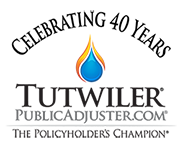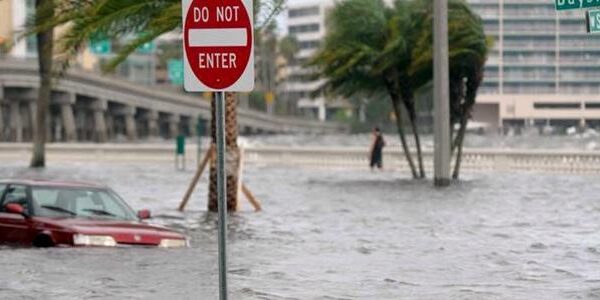Since Hurricane Idalia impacted Florida’s west coast, our public adjusters have been besieged with questions about flood claims. I also noticed from initial state claims data that many claims are being closed without payment. This may be due to policyholders not understanding what is covered under their homeowner’s policy vs. their flood policy, if they have one. We are receiving concerning feedback from policyholders who are feeling frustrated in the initial stages of the claims process, especially from the moment they report their first notice of loss.
Therefore, I thought it would be helpful and hopefully educational to explain the distinction between a flood event and a water loss since these terms are often misused by policyholders filing a claim. In addition, for those who do have flood insurance, we want to share some knowledge and information in the form of tips from my firm’s extensive experience with these losses.
While it is human nature to want to quickly repair and restore your property, please make sure you are taking the proper steps to comply and meet the requirements as a policyholder. Furthermore, take a moment to carefully review the NFIP flood claim guidelines, as they have undergone numerous recent updates. See: NFIP Claims Manual (Effective June 29, 2023).
Here are some initial insights from our adjusters, presented in Part 1 of our blog series:
Safety:
This is the number one priority after any storm. Exercise caution in damaged areas with debris. Ensure your safety during cleanup by donning protective gear such as boots, gloves, and masks. Seek assistance for moving bulky debris and always be vigilant for nails.
Claim Reporting:
It is vital to promptly report your claim. When detailing the damage, be as precise and descriptive as you can. In insurance terminology, flood damage typically refers to losses from rising water. If you have sustained such damage, measure and capture images of flood lines, both inside and outside your property. For other water related damages, immediately spot and photograph wet areas, both inside and out. Document any openings created by the storm, such as roof breaches, broken or displaced windows, or other points where daylight is new and visible from inside. While it is common to sustain both flood and wind damage, precision is paramount when filing your claim. Clearly articulate the damage but choose your words carefully for accuracy.
Emergency Services:
Since most policyholders will be using a water restoration dry-out company to start the mitigation and remediation process, you need to understand the guidelines and rules in which FEMA and the National Flood Insurance Programs pays. If not, you could find yourself facing substantial out-of-pocket expenses, a contractor’s lien on your property, or, in a worst-case scenario, a denied insurance claim. Ever since Superstorm Sandy, these restrictions have become even more onerous. As a reference, information you should consider with your contractor related to remediation and other associated costs can be found in the October 2021 Claims Manual Section 2.46 Remediation, Drying, and Emergency Service Contractors (page 276) and the Claims Guidance – Structural Drying and Other Related Items Bulletin w-13025a.pdf. (floodsmart.gov).
We recommend policyholders discuss and submit restoration bids ASAP to their assigned flood adjuster. The flood adjuster may require that both an itemized invoice for each room and a correctly filled drying log are submitted as per industry standards and the SFIP. For effective claim management, adjusters must be well-informed about which cleanup actions are both necessary after a flood and covered by the SFIP. This applies to board-up and roof tarping, if needed, to submit to your homeowners insurance company. You should keep the insurance company updated every step of the way and do not be afraid to request that all agreements be put in writing.
Elevation Certificate: The flood adjuster might ask for this and it is a good idea to have it on hand. More below.
Proof of Loss: NFIP flood policies usually require a complete proof of loss to be submitted within 60 days of the storm. Data Release from NWS states Hurricane Idalia made landfall on the morning of August 30th along the coast of Taylor County Florida near Keaton Beach at approximately 745 am EDT. At the time of this writing, the deadline date is Sunday, October 29, 2023. Policyholders can always submit their own POL. Otherwise, the adjuster will prepare a POL for the policyholder to sign so be sure it is accurate, compliant, and submitted on time.
NOTE: A Proof of Loss (POL) form is your signed and sworn statement explaining how much it would cost to repair or replace the damaged property you are claiming under the insurance policy, but completing and signing the POL form alone does not meet all SFIP requirements. Policyholders are encouraged to submit the POL and include additional documentation to support the dollar amount being requested. Below are few takeaways listed in the NFIP Claims Manual:
- The policyholder must also provide documentation to support the loss and dollar amount declared on the form.
- The policyholder must submit a POL within 60 days of the date of loss or within any extension granted by FEMA. The adjuster may assist the policyholder in completing the POL; however, this assistance is only a courtesy.
- When a policyholder believes they are owed payment, FEMA requires a fully completed NFIP POL form, signed by the policyholder(s) with the required documentation, on every claim on which the adjuster recommends payment.
- A signed Increased Cost of Compliance (ICC) POL is required on valid ICC claims.
- POL forms do not have to be notarized. Electronic signatures are acceptable.
Read more about Proof of Loss in our previous blog.
FEMA’s 50% Rule – The Substantial Damage Clause After Hurricane Idalia
In the wake of Hurricane Idalia, policyholders may face the costly and daunting task of rebuilding and elevating their homes. Here’s a brief overview and its potential implications for those affected:
Understanding the Rule: Although the building codes in play are enforced by the local government, they originate with FEMA’s flood insurance program. To remain a part of it and have access to inexpensive flood insurance and federal relief money after a storm, communities agree to build to a certain standard. One of those standards includes rebuilding destroyed homes better than they were before. After a hurricane, if repair costs meet or exceed 50% of a building property’s market value, it is considered “substantially damaged” and must be rebuilt to the newest codes, which frequently means elevating the building to a specified height above the base flood elevation.
Financial Implications: This rule can translate to a substantial financial burden for homeowners. Elevating a home or making it compliant with current floodplain standards is no small feat and can be costly.
Why it Matters: The rule’s primary objective is to reduce the risk of future flood damage. It ensures that properties, especially those in high-risk flood zones, are rebuilt to be more resilient to future flooding events.
Know Your Property’s Value: Homeowners should be proactive in getting an accurate pre-flood valuation of their property. In cases where damage assessment borders the 50% mark, having a precise valuation can make a significant difference.
Seek Assistance: There might be grants, loans, or other financial aid available to help homeowners with the costs associated with complying with this rule. It is worth exploring local, state, and federal resources.
While policyholders navigate the claims and repair process, keep in mind that FEMA’s 50% Rule aims to promote long-term resilience against floods, it can mean additional costs for homeowners affected by Hurricane Idalia. Being well-informed and proactive can assist homeowners in this challenging time. Stay tuned for Part 2.
If you have questions regarding Hurricane Idalia flood or water related property insurance claims visit our website or contact us to submit a question to one of our public adjuster insurance claim experts.

